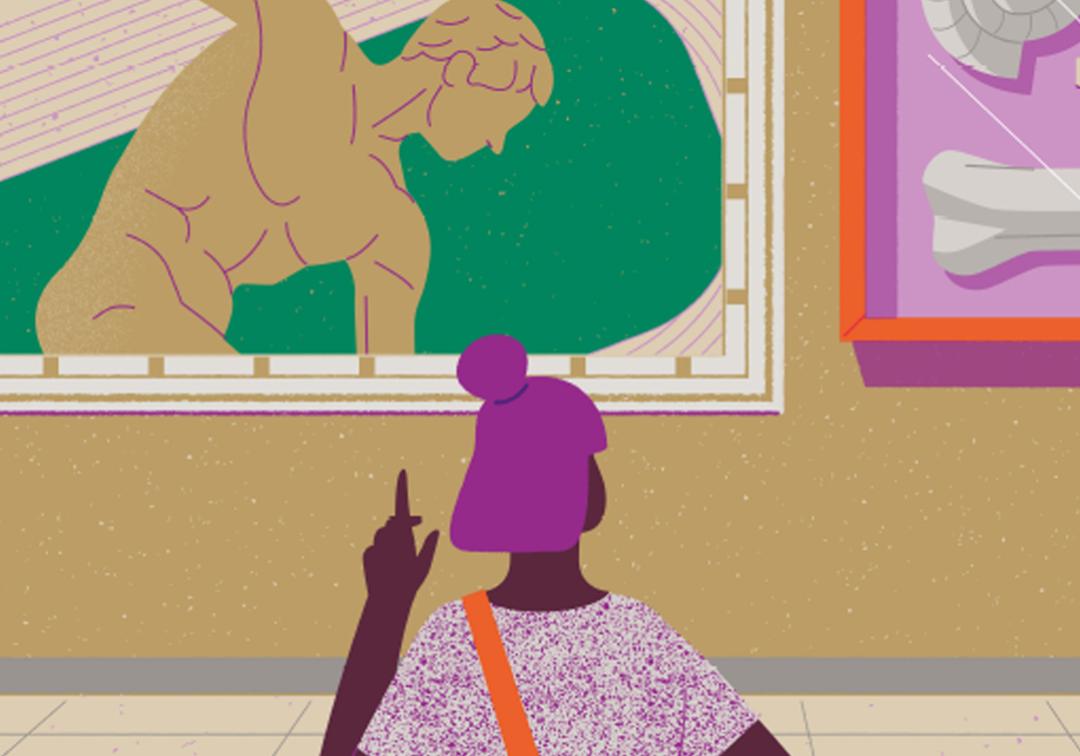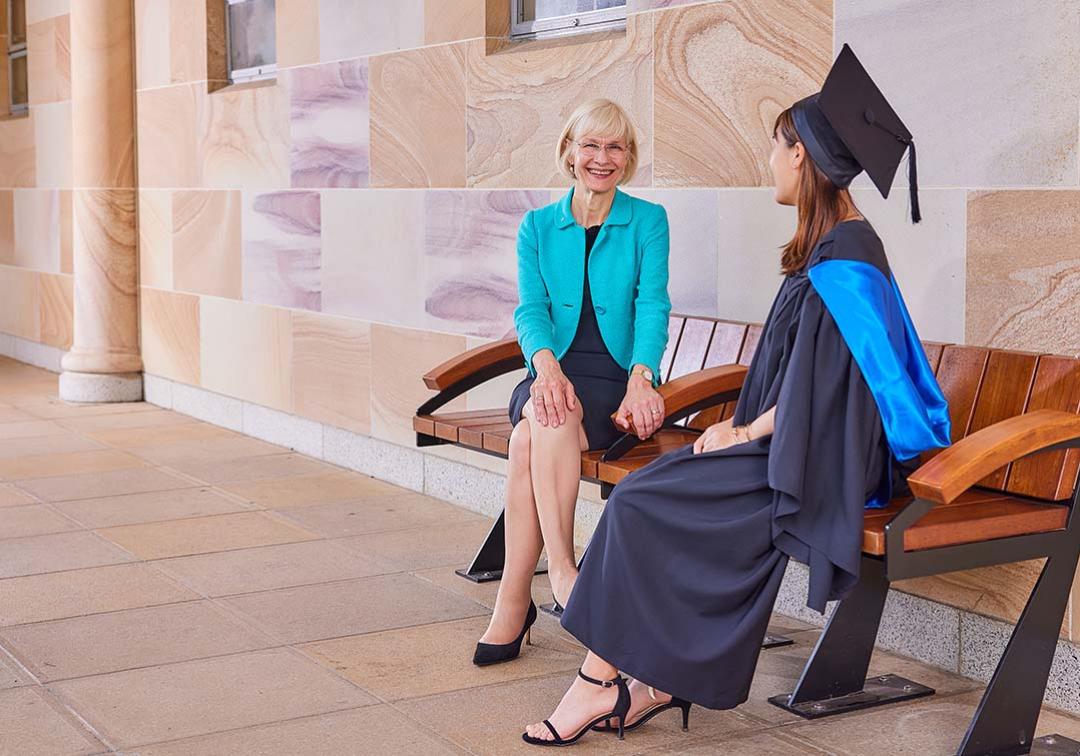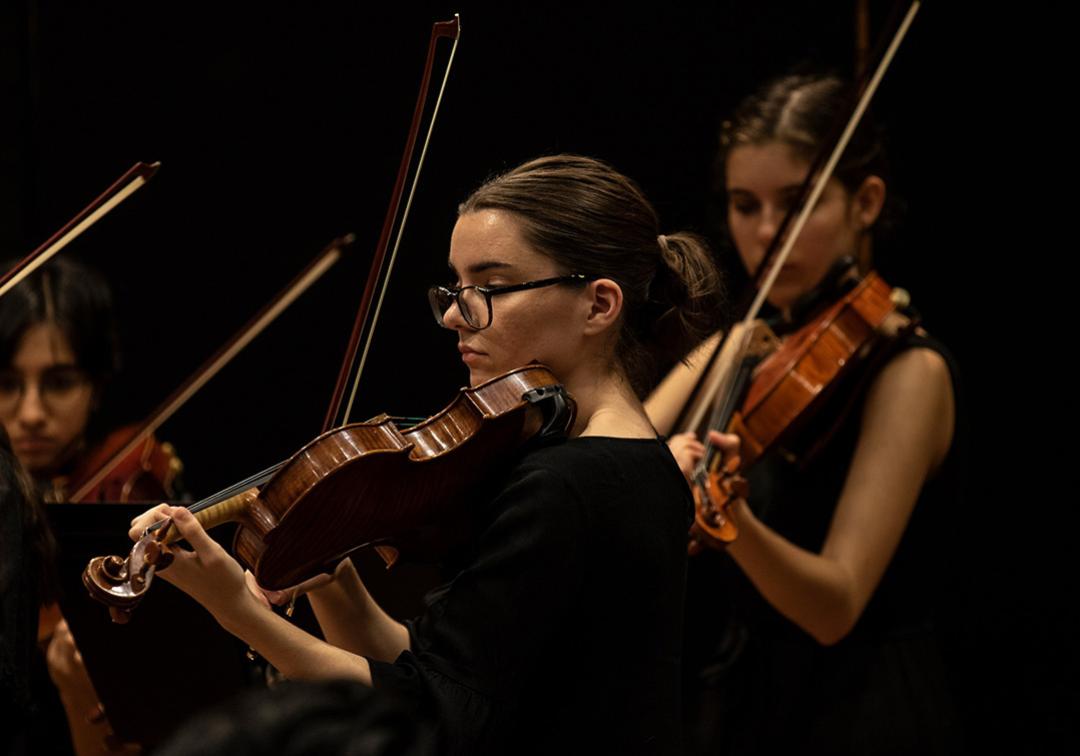
Bachelor of Advanced Humanities (Honours)
Overview
Big picture. Big ideas. A stimulating and challenging program for high-achieving students with a passion for understanding the world we live in.
Throughout this 4-year honours program you'll develop valuable logical reasoning, communication and creative thinking skills that can be applied across a range of areas and industries. Our humanities disciplines study society and culture in all its forms, looking for answers to significant and urgent social problems.
You'll join an engaging cohort who'll stay together throughout the 4 years of study. You will also enjoy a number of extracurricular activities, such as an orientation camp in your first year.
During the program, you'll study a core suite of interdisciplinary courses including:
- Great Works and the Humanities
- Humanities and the Big Questions
- Interdisciplinary Thinking
These courses and your majors will expose you to contemporary thinking in the humanities, provide a forum for interdisciplinary discussion and emphasise connections across humanities disciplines.
Graduating with a Bachelor of Advanced Humanities (Honours) equips you with professional research and critical thinking skills, which you can apply across a range of areas from analysing the ethics of biotechnology to policy development.
Program highlights
- Immerse yourself in a creative and diverse curriculum with a strong focus on key intellectual works that have shaped humanity.
- Organise and run a research symposium and take on an internship which offers you the possibility to hone your professional practice and start building your networks.
- Engage with leading humanities researchers from your first year of study and participate in the university’s research culture, applying and developing your analytical skills through practice-led learning.
- 15 scholarships of at least $20,000 per year for 3 years are available to eligible domestic students studying the Western Civilisation extended major.
Majors
Tailor your studies to suit your goals. This program offers these options:
- Ancient History
- Art History
- Drama
- English Literature
How you'll learn
Your learning experiences are designed to best suit the learning outcomes of the courses you choose.
- Lectures
- Tutorials
- Work placements
- Overseas study
- Research experience
- Workshops
What you'll study
At UQ, degrees are called 'programs' and subjects are called 'courses'. Here's a sample of the courses you could study in this program:
- Great Works and the Humanities
- Humanities and the Big Questions
- Interdisciplinary Thinking
- Perspectives in Humanities
Career possibilities
Our programs prepare you for your first job and beyond. Depending on which major you choose, here are some of the careers you could be on your way to:
- Academic researcher
- Sociologist
- Diplomatic officer
- Humanitarian services coordinator
- Classics teacher
- Human research ethics officer
- Historical researcher
- Music critic
- Editor
- Policy and advocacy adviser
Events
See all events
29 June - 6 July
Year 11 Queensland Chemistry Winter School

29 June
Voyages to the Underworld: UQ Centre for Western Civilisation Winter School

29 June
Queensland Biology Winter School, Year 12
Stories
See all stories
Uni life
What's it really like to study advanced humanities at UQ?
5-minute read

Careers
Explore the past to create a better future with a Bachelor of Arts
9-minute read
Stories
See all stories
Uni life
What's it really like to study advanced humanities at UQ?
5-minute read

Careers
Explore the past to create a better future with a Bachelor of Arts
9-minute read
Entry requirements
Prerequisites
- General English subject (Units 3 & 4, C).
Prerequisites
- General English subject (Units 3 & 4, C).
Entry score threshold
This table shows the minimum adjusted score that was considered for admission to the B AdvancedHumanities(Hons) in 2025
| ATAR / Rank | IB |
|---|---|
| 90 | 35.5 |
This table shows the minimum adjusted score that was considered for admission to the B AdvancedHumanities(WCIV)Hons in 2025
| ATAR / Rank | IB |
|---|---|
| 95 | 39 |
These are the lowest adjusted scores we made an offer to in Semester 1, 2025. Entry scores are based on the most recent Semester 1 intake and are updated in April each year. Meeting the entry score threshold doesn't guarantee admission.
Guarantee your place at UQ: If you meet our guaranteed minimum ATAR you could secure an offer for your preferred program.
English language requirements
IELTS overall 6.5; reading 6; writing 6; speaking 6; listening 6. For other English Language Proficiency Tests and Scores approved for UQ
TOEFL iBT (including Paper Edition) - Overall 87, listening 19, reading 19, writing 21 and speaking 19.
PTE Academic - Overall Score of 64 and 60 in all sub bands.
BE - A minimum overall grade of 4 plus a minimum grade of C in all macro skills.
CES - Overall 176 and 169 in all sub bands.
OET is not accepted.
There are other ways to meet the English language requirements. For some programs, additional conditions apply.
Student visas
International students who are accepted into full-time study in the Bachelor of Advanced Humanities (Honours) are eligible to apply for an Australian student visa (subclass 500).
There are a number of requirements you must satisfy before a visa is granted, including the Genuine Student (GS) requirement.
Entry score range
This table shows the range of entry scores for recent secondary students offered a place in the B AdvancedHumanities(Hons) for Semester 1, 2025
| Without adjustments | With adjustments | |
|---|---|---|
| Highest | 98.8 | 99.95 |
| Median | 92.15 | 93.45 |
| Lowest | 87.05 | 90 |
This table shows the range of entry scores for recent secondary students offered a place in the B AdvancedHumanities(WCIV)Hons for Semester 1, 2025
| Without adjustments | With adjustments | |
|---|---|---|
| Highest | 98.8 | 99.95 |
| Median | 95.3 | 97 |
| Lowest | 91.05 | 95.55 |
Who you'll study with
Here's a snapshot of our student intake for this program in Semester 1, 2025:
| Applicant background | Number of students | Percentage of all students |
|---|---|---|
(A) Higher education study | N/P | N/P |
(B) Vocational Education and Training (VET) study | <5 | <5 |
(C) Work and life experience | 0 | 0% |
| (D) Recent secondary education | ||
| 70 | 85.4% |
| 0 | 0% |
| 0 | 0% |
International students | 0 | 0% |
Total | 82 | 100% |
"<5" — The number of students is less than 5.
N/A — Students not accepted in this category.
N/P — Not published. The number is hidden to protect the privacy of students in other cells.
Need help meeting the entry requirements?
Majors
Majors
Tailor your studies to suit your goals. This program offers these options:
Majors
Tailor your studies to suit your goals. This program offers these options:
Fees and Scholarships
Indicative annual fee
Approximate yearly cost of tuition (16 units). Your fees will vary according to your selected courses and study load. Fees are reviewed each year and may increase.
$15,760
2026
Approximate yearly cost of tuition (16 units). Your fees will vary according to your study load. Fees are reviewed each year and may increase.
AUD $45,792
2026
Additional costs
- First-year student camp cost of approximately $90.
- First-year student camp accommodation and meal costs are covered by the University. Students may choose to bring money for personal purchases.
Government assistance
Financial aid
As an international student, you might be eligible for financial aid – either from your home country, or from the Australian Government.
HECS-HELP
Domestic places in the Bachelor of Advanced Humanities (Honours) are Commonwealth supported, as long as you meet all Commonwealth supported place eligibility requirements.
This means the cost of your education is shared between you and the Australian Government. Instead of tuition fees, Commonwealth supported students pay what are called student contribution amounts.
If you have a Commonwealth supported place, you may also be eligible for HECS-HELP. This is an Australian Government loan scheme to assist eligible students with the cost of their student contribution amounts.
Centrelink support
The Australian Government offers a number of income-support payments to eligible Australian university students.
Scholarships
You may be eligible for more than 100 scholarships, including:
How to apply
Applying online
If your senior schooling is from outside Australia, you can submit your application to UQ. Or, if you prefer, you can use an approved UQ agent near you.
The program code for the Bachelor of Advanced Humanities (Honours) is 2414.
How to apply for undergraduate study
If your senior schooling is from Australia
Submit your application to the Queensland Tertiary Admissions Centre if you're an international student who is currently studying:
- Australian Year 12 (in Australia or another country), or
- the International Baccalaureate in Australia.
There are two QTAC codes for the Bachelor of Advanced Humanities (Honours):
- 757201 (for the extended major in Western Civilisation)
- 757101 (for all other majors).
You can use one or both QTAC codes when you apply.
Applying through QTAC
All domestic applications should be submitted to the Queensland Tertiary Admissions Centre (QTAC).
There are two QTAC codes for the Bachelor of Advanced Humanities (Honours):
- 757201 (for the extended major in Western Civilisation)
- 757101 (for all other majors).
You can use one or both QTAC codes when you apply.
Important dates
If you’re studying Year 12 in Australia, go to the QTAC website to check the closing date for this program.
If you’re applying to UQ, the closing date for this program is:
- To commence study in semester 1 - November 30 of the previous year.
Visa processing times vary. Apply and accept your offer as early as you can.
To learn more about UQ dates, including semester start dates, view the Academic Calendar.
Important dates
To check the closing date for this program, go to the QTAC website.
To learn more about UQ dates, including semester start dates, view the Academic Calendar.
Admissions schemes
Applying to university can be both exciting and daunting, which is why we’ve tried to make the process as simple as we can.
We have several schemes in place to improve your chances of getting a place at UQ.
Pathway options
A rank or score doesn’t determine your potential.
If you're not offered a place in your first-choice program – or if you don't meet the entry requirements – you still have a number of options.
Aboriginal and Torres Strait Islander applicants
For support with applying – or if you have any questions about university life – get in touch with our Aboriginal and Torres Strait Islander Studies (ATSIS) Unit.
Explore other programs
Express yourself. And your interest.
They say choosing a degree is hard, which is why we've made it easy. Register your interest and we'll send you everything you need to know about applying to UQ.





